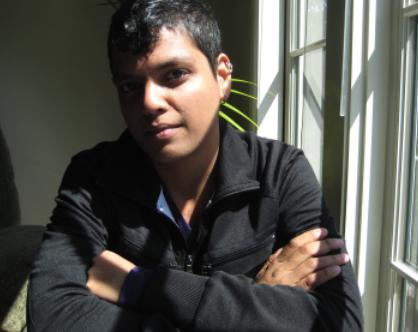“A lot has changed in the past decade,” says queer Indian filmmaker Natasha Mendonca.
In 2003, Mendonca co-founded Larzish, India’s first queer film festival, despite harsh censorship laws. “In 2002 and 2003, people didn’t know anything about homosexuality except that it was a disease,” she says.
At the time, gay sex was officially criminal in India.
“It was really hard to get something as simple as a venue, because people didn’t want to be associated with anything that’s criminalized in India. We have very archaic laws on obscenity, but we didn’t want to have any kind of censorship in our programming,” she explains. “Some of the journalists reported it as a film festival on sex, so the police cracked down, trying to figure out what we were doing.”
In the end, Mendonca says, her group ran Larzish as a private event, with help from lawyers at the India Centre for Human Rights and Law.
Larzish was amicably discontinued after two iterations, and since then Mendonca has focused on her own projects, such as an upcoming feature about trans and class identity in Bombay. But in its wake, a number of new queer film festivals have sprung up, burgeoned by a newly vocal discourse around queer issues in India.
Though Mendonca is pleased with the new openness, she is hesitant to celebrate what she sees as a normalizing political trend.
“Some of the queer festivals in India right now are more about clean gay films,” she observes. “There could be so many ways the movement could go, but it always goes following the West. Everybody is already talking about gay marriage, and that’s just so boring because there are trans issues, women’s issues, queer suicides, queer youth, homelessness — issues that are not really on the agenda that should be.”
A more locally-grounded approach is salient in Mendonca’s own work. In her recent non-narrative film Jan Villa, she returns home after two years abroad to a Bombay flattened by 2005’s monsoons. The film, which will screen in Toronto on March 22 as part of the South Asian Visual Art Centre’s (SAVAC) experimental film program, Monitor, is in some ways a personal exploration of family and memory. However, it could just as easily be seen as a wide and melancholy love song to the ancient, if broken, city of Bombay.
“I’m looking at how buildings and things have memories, how people have homes and bodies that also have memories, like the city, the architecture,” Mendonca explains.
In one of the film’s more personal moments, Mendonca and her mother are shown lying silently in the nude, letting the camera’s gaze wash over their bodies. Glimpses into family tensions quietly accompany jarring close-ups of a literally broken home.
“The diaspora is something I’m not interested in. I don’t really identify with the diaspora community,” Mendonca admits. “My whole experience of living in a postcolonial context is very different.”
Monitor, which SAVAC has been running for eight years, includes work by film and video artists from a multitude of experiences.
“Not all of the work we pick is specifically by South Asian artists, and SAVAC’s idea of South Asian is quite fluid,” notes programming coordinator Sharlene Bamboat.
And though SAVAC doesn’t specifically include queer work, identity-oriented programming inevitably brings intersectional commentaries to the surface. In fact, the centre has it roots in Toronto’s queer South Asian community.
Previously known as the South Asian Visual Arts Collective, the organization spun off of Desh Pardesh, a queer performance, dance and art festival begun in the late ‘80s. Currently, it is the only artist-run centre devoted to South Asian issues in Canada.
There is thus an interesting inversion between SAVAC’s status as a group representing South Asian issues in a queer and urban Canadian context and Mendonca’s individual work around queer issues in an urban Indian context, both utilizing experimental film practice. And it is precisely this kind of kinetic spatial and temporal exchange that Monitor seeks to explore.
“All of the films and videos presented in Monitor engage with the shifting terrain of the built environment,” says this year’s programmer, Jacob Korczynski. “The architecture of the present as it pushes its way into a future, the landscape of the past as it returns as reflection.”
The Deets:
Monitor 8: New South Asian Short Film and Video
Featuring works by Natasha Mendonca, Panchal Mansaram and others
Thurs, March 22, 7:30pm
Innis Town Hall
2 Sussex Ave
This show will also tour Mississauga, Montreal and Kingston in the next few months

 Why you can trust Xtra
Why you can trust Xtra


